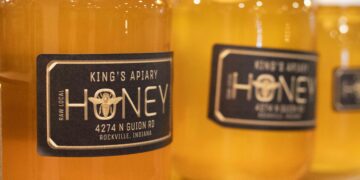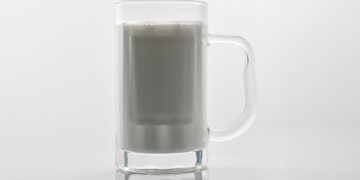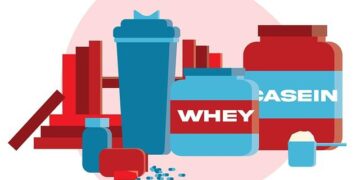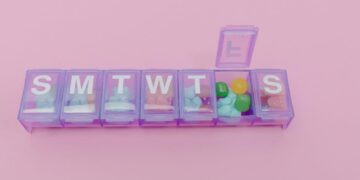Table of Contents
Introduction: The Bottle of Betrayal on My Bathroom Counter
As a health journalist, I thought I was savvy. I live and breathe this stuff. I know the difference between marketing fluff and clinical data. So when I needed to restock my magnesium glycinate—a supplement I take for sleep and muscle relaxation—I did what millions of us do. I went to a massive online retailer, found a product with a trusted brand name, thousands of glowing reviews, and a “Bestseller” badge. I clicked “Buy Now” without a second thought.
That click was a mistake.
Within a week, something was wrong. Instead of the usual calm, I was hit with waves of stomach distress, bloating, and dull, persistent headaches.1 I stopped taking everything new, and the symptoms vanished. Suspicious, I examined the bottle. It looked perfect—the label, the seal, the logo. But on a hunch, I bought the same product directly from the brand’s official website. When the new bottle arrived, the differences were subtle but undeniable: a slightly different font on the lot number, a capsule color that was a shade off, a faint chemical smell the real one didn’t have.3
I contacted the brand, sent them photos and the lot number. Their response was swift and chilling: I had purchased a sophisticated counterfeit. The bottle on my counter was a lie. It wasn’t just a waste of money; it was a violation of trust that had actively harmed my health. That experience lit a fire in me. It wasn’t enough to be a savvy consumer anymore; I had to become a forensic investigator. I spent months diving into the dark corners of the supplement industry, and what I found was a landscape far more dangerous than I ever imagined.
This article is the result of that investigation. It isn’t just another list of “best stores.” It’s the foolproof framework I developed to protect myself and my family—a system to navigate the treacherous, unregulated waters of the online supplement market. It will teach you how to shift your focus from the marketing claims on the front of the bottle to the verifiable integrity of the product’s entire supply chain. It will empower you to trade fear for fortitude and find supplements that are truly safe and effective.
Part 1: The Wild West – Why “Shopping Around” for Supplements Is a Dangerous Gamble
My experience with the fake magnesium wasn’t a fluke. It was a symptom of a deeply broken system. To understand how to buy supplements safely, you first have to understand why the market is so uniquely hazardous. It’s a “Wild West” environment where the sheriff is often late to the scene and bandits can easily pose as honest shopkeepers.
The Illusion of Safety: Understanding the FDA’s Role (Or Lack Thereof)
The single biggest misconception that fuels this dangerous market is the belief that dietary supplements are regulated like prescription drugs. They are not. The U.S. Food and Drug Administration (FDA) does not review or approve supplements for safety and effectiveness before they hit the shelves.5
Under the Dietary Supplement Health and Education Act (DSHEA) of 1994, the legal responsibility for ensuring a product is safe and that its label is truthful falls squarely on the manufacturer.8 The FDA’s role is primarily one of
post-market enforcement. This means the agency can only take action—like issuing a recall or warning—after a product is already being sold and has potentially harmed consumers.8
This regulatory void is not just a procedural detail; it’s a structural vulnerability that has become a business opportunity for criminals. When there is no pre-market gatekeeper, the barrier to entry for selling a product is astonishingly low. For a counterfeiter, this means they can manufacture a fake product, create a convincing label, and list it on a major online platform with a minimal upfront risk of being stopped. The potential for massive profits combined with this low regulatory friction creates a perfect storm, making the $167.5 billion global supplement industry an irresistible target for organized fraud.12 This isn’t a problem of a few bad apples; it’s a systemic weakness being actively and relentlessly exploited.
The Digital Hydra: Counterfeits, Contaminants, and Commingled Inventory
The greatest danger in the online supplement world isn’t just buying a sugar pill that doesn’t work. It’s buying a product that is actively harmful. The digital marketplace, particularly massive e-commerce sites, has become a breeding ground for this exact threat.
The counterfeit crisis is real and well-documented. Respected brands like NOW Foods and Fungi Perfecti have uncovered extensive networks of fraudulent storefronts on platforms like Amazon, Walmart, and eBay.4 These fakes are not just inert placebos. Investigators have found counterfeit capsules filled with nothing but rice flour, while others contained undeclared allergens like soy and gluten, posing a serious risk to sensitive individuals.4 Even more alarmingly, some fakes have been found to contain hidden prescription drugs like Sildenafil (the active ingredient in Viagra) or the banned weight-loss drug sibutramine.4
The FDA itself has discovered hundreds of “dietary supplements” tainted with these hidden and dangerous ingredients, especially in products marketed for weight loss, sexual enhancement, and bodybuilding.5 The consequences can be severe, with documented cases of strokes, acute liver injury, kidney failure, and even death linked to these contaminated products.6
The structure of major online marketplaces exacerbates this problem. A critical flaw, especially on Amazon, is the practice of “commingled inventory”.17 Even if you diligently find a product page that says “Sold by,” the item you receive may be pulled from a large bin at the warehouse that contains identical-looking products from dozens of different third-party sellers—including counterfeiters. One Reddit user shared a harrowing story of their child having an allergic reaction to a trusted supplement brand purchased on Amazon, suspecting a counterfeit from this exact issue.17 This system makes it functionally impossible to guarantee authenticity, even when you think you’re buying from the official source.
This reality completely erodes the traditional signals of trust we rely on for online shopping. We are conditioned to trust high star ratings, thousands of reviews, and “Bestseller” or “Amazon’s Choice” badges. In the supplement world, this is a trap. Counterfeiters can and do manipulate reviews. A product with 5,000 five-star reviews can still be dangerous.5 Because of commingled inventory, even if 99% of those reviews are for the legitimate product, the fake one can still land in your cart. The entire mental model of what makes a product trustworthy online is inverted. For supplements, high popularity on a mass marketplace can actually increase the risk, as popular products are the most profitable targets for counterfeiters.
The Art of Deception: How Marketing Preys on Hope
Beyond the outright fraud of counterfeits lies the pervasive issue of deceptive marketing. The Federal Trade Commission (FTC) and the FDA are locked in a constant battle against companies that use misleading claims to prey on the hopes of consumers.18
You must learn to spot the red flags. Be immediately suspicious of any product that promises a “quick fix,” a “miracle cure,” or claims it can treat, prevent, or cure serious diseases like cancer, Alzheimer’s, or infertility.6 Under federal law, such claims are illegal for dietary supplements. Marketers often use pseudo-scientific jargon like “thermogenesis,” “glucose metabolism,” or “molecule multiplicity” to sound legitimate, sometimes even making phony references to Nobel Prize-winning technology.6
Even the word “natural” is a red flag when used to imply safety. Arsenic is natural. So is lead. Many “all-natural” botanical products, such as comfrey and kava, have been shown to cause serious liver damage.8 The FTC is constantly pursuing legal action against companies for making these unsubstantiated claims, but the sheer scale of the internet allows new “snake oil salesmen” to pop up every day, reaching a global audience with just a few clicks.18
Part 2: The Epiphany: You Don’t Buy a Supplement, You Buy a Supply Chain
After my health scare with the counterfeit magnesium, I sat staring at the two bottles on my kitchen table—the fake and the real. And in that moment, I had my epiphany. My entire approach had been wrong. I was focused on the front of the bottle: the brand name I recognized, the convincing marketing claims, the thousands of reviews, the competitive price. I was evaluating the finished product as it was presented to me.
I realized the secret to safety wasn’t on the front of the bottle; it was in the story behind the bottle. I needed to stop evaluating the product and start evaluating its entire journey—from the sourcing of raw ingredients to the manufacturing process, the testing protocols, and the final point of sale. I no longer buy a supplement; I buy a supply chain.
Think of it like choosing a restaurant. You can go to a place with a beautifully written menu full of appetizing descriptions (the marketing claims). But is that enough to trust the food? Of course not. The real sign of quality comes from peeking into the kitchen. Is it spotlessly clean and organized (cGMP certified)? Are the chefs using fresh, high-quality ingredients from reputable farms (transparent sourcing)? Does an independent health inspector visit regularly and give them an ‘A’ grade (third-party certification)? A fancy menu from a dirty kitchen with questionable suppliers is a recipe for food poisoning. The same is true for supplements. The most compelling label in the world is worthless if the product was made in a contaminated facility with untested ingredients and sold through a channel rife with fakes.
This new paradigm—evaluating the supply chain, not the sales pitch—is the key to navigating the market safely. It shifts the power back to you, the consumer.
Part 3: The Trust-Verification Framework: A 3-Tier System for Vetting Any Online Supplement Store
Based on my “supply chain first” philosophy, I developed a simple three-tier system for classifying online supplement retailers. This framework organizes stores into a hierarchy of risk, allowing you to instantly gauge the safety of a potential purchase. It moves from the most secure, closed-loop systems to the most dangerous, open-market minefields.
Tier 1: The Gold Standard (The Fortresses of Trust)
These are the safest places to buy supplements online, period. They are closed-loop, curated ecosystems where the risk of receiving a counterfeit or improperly handled product is virtually zero. They achieve this by controlling the entire supply chain and eliminating the untrustworthy third-party seller.
Example 1: The Practitioner Dispensary – Fullscript
Fullscript operates on a unique and highly secure model. It is not a traditional online store open to the general public. Instead, it is a professional-grade dispensary platform that allows licensed healthcare practitioners (like doctors, naturopaths, and registered dietitians) to prescribe and dispense supplements directly to their patients.23
- Why It’s Safest:
- Expert Curation: The catalog is not an open free-for-all. Fullscript’s quality assurance teams, which include healthcare professionals, rigorously vet every single brand they carry. They require annual proof of third-party cGMP (Current Good Manufacturing Practices) certification from every brand partner.23
- No Third-Party Sellers: They source products directly from the manufacturers. This completely eliminates the risk of counterfeit infiltration that plagues marketplaces like Amazon.23
- Pristine Distribution: Fullscript operates its own network of state-of-the-art, NSF GMP-registered distribution centers. This ensures that products are stored in climate-controlled environments and handled correctly, preserving their potency and preventing degradation.23 They even have their own “Fullscript Tested” program, where they pull select products for additional third-party testing to verify purity and potency.
Example 2: The Direct-to-Consumer Scientist – Thorne
Thorne is a premier “practitioner brand” that has built its reputation on an obsessive commitment to science, purity, and transparency. While historically sold through healthcare professionals, they now also sell directly to consumers from their own website, giving you access to one of the most rigorously controlled supply chains in the industry.24
- Why It’s Safest:
- Unmatched Testing: Thorne conducts a minimum of four rounds of testing on every product in its own advanced, in-house laboratories. They test raw materials and finished products for identity, potency, and purity.24
- Elite Global Certifications: Their manufacturing facility in South Carolina is not only cGMP compliant but also certified by NSF International. Even more impressively, it holds an ‘A’ rating from Australia’s Therapeutic Goods Administration (TGA), which has some of the most stringent supplement regulations in the world.24
- Trusted by the Best: Over 40 of Thorne’s products are NSF Certified for Sport, the highest level of certification for athletes.25 They are an official partner of the Mayo Clinic and numerous U.S. Olympic teams, and their products are used in clinical trials around the globe.27 Buying from Thorne is buying directly from the lab.
The common thread for Tier 1 retailers is the price. Brands like Thorne are consistently more expensive than what you’ll find on Amazon.28 This isn’t just a markup for a fancy label. You are paying for the peace of mind that comes from their business model, which internalizes the cost of trust. The millions invested in in-house labs, multiple rounds of testing, and pursuing elite third-party certifications are significant operational expenses. Cheaper brands on open marketplaces externalize this cost and risk directly onto you, the consumer. A higher price from a Tier 1 source isn’t just for the ingredients; it’s a fee for guaranteed authenticity, purity, and safety. You are paying to
not have to worry.
Tier 2: The Silver Standard (The Verified Champions)
This tier consists of high-quality, reputable brands that demonstrate a strong, public commitment to quality and transparency through multiple third-party certifications. While they may be available through various retailers, the safest way to purchase them is always directly from the brand’s official website. This allows you to leverage their quality control while bypassing the counterfeit risk of Tier 3 marketplaces. The key to identifying these champions is learning to read the seals on the label.
Decoding the Seals of Approval: Your Guide to Verifiable Trust
The alphabet soup of logos on a supplement bottle can be confusing. They are not all created equal. This table breaks down the most important certifications, what they actually mean, and how you can use them to make smarter choices.
| Seal Logo | Certification Name | What It Verifies | What It Doesn’t Verify | Key Takeaway for You |
| !(https://encrypted-tbn0.gstatic.com/images?q=tbn:ANd9GcR8l0b-4y9kXn-yVf7p4wz3hQ6JzXg9R-t-w&s) | NSF/ANSI 173 & Certified for Sport | Product in Bottle Matches Label: Confirms ingredient identity and quantity. No Harmful Contaminants: Tests for heavy metals, pesticides, microbial contaminants, etc. For Sport: Screens for over 280 substances banned by major athletic organizations.30 | Efficacy: Does not guarantee the product will achieve your specific health goal. | This is a gold standard for safety, purity, and accuracy. The “Certified for Sport” seal is the highest level of assurance available, essential for competitive athletes. |
| !(https://encrypted-tbn0.gstatic.com/images?q=tbn:ANd9GcR-f9y-m7Z-w6J-k7z-g5x-H8t-Y9w-r-T5A&s) | USP Verified Mark | Product in Bottle Matches Label: Confirms ingredient identity, potency, and purity. Proper Manufacturing: Verifies the facility follows cGMPs. Bioavailability: Ensures the supplement will break down and release properly in the body.32 | Efficacy: Does not guarantee a specific health outcome. | Another gold standard, highly respected by pharmacists and doctors. A very strong signal of a high-quality product. Nature Made has the most USP-verified products.33 |
| !(https://encrypted-tbn0.gstatic.com/images?q=tbn:ANd9GcT-o-p-j6b-k8X-y-w7Z-g-X-f-R9y-t-A6A&s) | Informed-Sport Certified | Banned Substance Testing: Tests every single batch of a product for a wide range of substances prohibited in sport before it is released to the market. Also conducts blind retail testing.34 | Overall Contaminants/Potency: The primary focus is on substances banned in sport, not necessarily the broader contaminant screen or potency verification of NSF/USP. | The top choice for elite and drug-tested athletes who need absolute certainty against inadvertent doping. |
| cGMP Certified | Facility & Process Quality: Confirms the manufacturer’s facility has been audited and follows FDA-mandated Current Good Manufacturing Practices for sanitation, procedures, and documentation to ensure consistent production.8 | The Final Product: This seal on a website verifies the facility, but it does not guarantee that a specific batch of a product has been independently tested for purity, potency, or label accuracy. | This is the absolute bare minimum. Do not buy from any brand that is not cGMP certified. But always look for product-specific certifications on top of this. | |
| !(https://encrypted-tbn0.gstatic.com/images?q=tbn:ANd9GcT-o-p-j6b-k8X-y-w7Z-g-X-f-R9y-t-A6A&s) | USDA Organic & Non-GMO Project Verified | Sourcing & Farming Methods: Verifies that ingredients were grown without the use of prohibited pesticides, synthetic fertilizers, sewage sludge, or genetic modification.38 | Purity, Potency, or Safety: Does not test for contaminants like heavy metals or microbes, nor does it verify that the ingredient dosage on the label is accurate. | Excellent seals for ensuring clean, natural sourcing. However, they must be paired with NSF, USP, or rigorous in-house testing to guarantee safety and accuracy. |
Example Tier 2 Brands:
- NOW Foods: A family-owned company since 1968, NOW is a giant in the natural products industry known for its commitment to affordability and quality. They are a prime example of a Tier 2 champion, holding an incredible array of certifications including cGMP, USDA Organic, Non-GMO Project Verified, and Informed-Sport for their sports line. They operate one of the most advanced in-house labs in the industry, performing approximately 31,000 tests per month to ensure their products are safe and accurately labeled.38
- Garden of Life: This brand’s philosophy is built on “clean” nutrition. They are leaders in using Certified USDA Organic and Non-GMO Project Verified ingredients sourced from whole foods. Beyond that, many of their products are also certified by NSF, including their sports line which is NSF Certified for Sport, and they hold certifications for being vegan, gluten-free, and kosher, demonstrating a deep commitment to transparency.39
- Pure Encapsulations: Another brand highly trusted by healthcare practitioners, Pure Encapsulations focuses on creating hypoallergenic supplements free from common allergens, unnecessary binders, and artificial additives. Their manufacturing facility is NSF-GMP registered, and they are a great option for individuals with sensitivities. They strongly advise purchasing only through authorized healthcare professionals or their own direct-to-consumer site to avoid the risk of counterfeits.46
Tier 3: The Red Zone (The Open-Market Minefields)
This tier represents the highest level of risk. It includes large, open e-commerce marketplaces where thousands of unvetted third-party sellers can list products with minimal oversight.
Primary Examples: Amazon, Walmart.com, eBay.
The evidence of risk on these platforms is overwhelming. They are the primary channels used by counterfeiters.5 The business model itself, with its reliance on third-party sellers and practices like commingled inventory, creates an environment where ensuring product authenticity is nearly impossible.17 Even for legitimate products, quality can be compromised. Supplements can sit for long periods in warehouses that aren’t climate-controlled, exposing them to heat and light that can degrade their potency and effectiveness.11
Shopping on these sites for supplements is driven by convenience and the perception of low prices. However, this convenience comes with a hidden “risk tax.” The few dollars you might save are a trade-off for a significant, unquantified risk of receiving a useless, contaminated, or outright dangerous product. The true cost isn’t the price on the screen; it’s the potential for negative health outcomes and the mental burden of performing extensive “harm reduction” checks that are completely unnecessary when buying from Tier 1 or Tier 2 sources.
Harm Reduction Checklist (If You Absolutely MUST Buy Here):
While I strongly advise against it, if you must purchase from a Tier 3 retailer, use this checklist to minimize your risk:
- Scrutinize the Seller: Look for products that are “Shipped from” and “Sold by” Amazon.com or Walmart.com directly. This is not a guarantee, but it is slightly safer than buying from an unknown third-party seller with a name like “BestHealthDealz.”
- Become a Forensic Inspector: When the product arrives, inspect it meticulously before opening. Look for broken seals, blurry printing, mismatched fonts or colors on the label, and compare it to a photo from the brand’s official website.3
- Trust Your Senses: Open the bottle. Does it have an unusual chemical smell? Are the pills or powder a different color, size, or texture than you expected? Do they have a strange aftertaste? These are all red flags.3
- Verify the Lot Number: Find the lot number and expiration date on the bottle. Contact the brand’s customer service directly and ask them to verify if it’s a legitimate lot number.
- Reject Suspicious “Bargains”: If the price is significantly lower than on the brand’s own website, it is very likely a counterfeit or expired product. Quality costs money; a steep discount is a major warning sign.49
Part 4: Your Personal Toolkit: How to Become Your Own Supplement Detective
My investigation gave me the framework, but the real power comes from having a practical toolkit to vet any brand or store you encounter. Here is the step-by-step process I now use for every supplement purchase.
The Vetting Checklist:
- Start with the Source (Apply the Tiers): Before you even look at a product, look at the store. Is it a Tier 1 (Fullscript, Thorne Direct), Tier 2 (NOW Foods Direct, Garden of Life Direct), or Tier 3 (Amazon, Walmart) retailer? This first step tells you 90% of what you need to know about your risk level. Prioritize Tier 1 and 2.
- Hunt for the Seals: Look at the product label online. Do you see the NSF, USP, or Informed-Sport seals? Refer back to the “Decoding the Seals” table. The presence of these top-tier, third-party certifications is one of the strongest indicators of quality.
- Investigate the Website: Go to the brand’s own website. Is it professional? Do they have a clear “About Us” page that tells their story? Is there a physical address and phone number? Do they have a detailed section on their quality control, testing, and manufacturing processes? Legitimate companies are proud of their quality and talk about it openly.3 Fake brands often have flimsy, generic websites with no real contact information or just stock photos.17
- Demand Transparency: Does the company talk about where its ingredients come from? Brands like Thorne are transparent about their global sourcing and supply chain oversight.24 Brands like Garden of Life are built on the traceability of their organic ingredients back to the farm.39 A lack of transparency is a red flag.
- Use an Independent Verifier: For an extra layer of confidence, use a service like ConsumerLab.com. It’s an independent company that buys supplements off the shelf and tests them for quality, purity, and label accuracy. They provide unbiased reviews and are an excellent resource for cross-referencing a brand’s claims.50
- Talk to a Professional: The safest and most effective path is always to work with a qualified healthcare professional, such as a doctor, registered dietitian, or pharmacist. They can assess your individual needs, recommend specific products, and often have access to trusted practitioner-grade brands through platforms like Fullscript.9
Conclusion: Trading Fear for Fortitude
The counterfeit bottle that once sat on my bathroom counter is long gone, but the lesson it taught me remains. I no longer fear buying supplements online, because I’ve replaced that fear with a system. I’ve traded the chaos of the “Wild West” for the clarity of the Trust-Verification Framework. I no longer fall for the siren song of 10,000 positive reviews or a price that seems too good to be true.
My hope is that this guide does the same for you. You don’t have to be a victim of a broken and dangerous market. You have the power to protect your health and your wallet. Stop being a passive consumer swayed by hype and start being an active, educated investigator of your own health.
The next time you shop for a supplement, don’t just look at the front of the bottle. Remember the restaurant kitchen. Evaluate the entire supply chain, from the farm to the facility to the final seal of approval. By adopting this new paradigm—by verifying before you trust—you can take control and purchase supplements not with anxiety, but with the confidence and fortitude you deserve.
Works cited
- Hewelth Bioclear Nails Max Reviews on Reddit and Beyond (2025) What People Really Say Important qumk9tk5l?, accessed on August 12, 2025, https://oig.dc.gov/sites/default/files/webform/medicaid_fraud_complaint_form/_sid_/HewelthBioclearNailsapprentice-o8cdpcl.pdf
- Digest Sync Reviews on Reddit and Beyond (2025) What People Really Say (8TEHY2B4), accessed on August 12, 2025, https://oig.dc.gov/sites/default/files/webform/medicaid_fraud_complaint_form/_sid_/DigestSyncsurplus-xz4kj7.pdf
- How to Tell if Supplements are Fake – Fullscript, accessed on August 12, 2025, https://fullscript.com/blog/how-to-tell-if-supplements-are-fake
- Blog | How to Spot Fake Supplements and Protect Your Brand from Counterfeits, accessed on August 12, 2025, https://www.marqvision.com/blog/fake-supplements-defense
- Avoiding Products Contaminated with Hidden Ingredients – FDA, accessed on August 12, 2025, https://www.fda.gov/drugs/medication-health-fraud/avoiding-products-contaminated-hidden-ingredients
- Dietary Supplements | Consumer Advice, accessed on August 12, 2025, https://consumer.ftc.gov/articles/0261-dietary-supplements
- Dangerous Dietary Supplements and False Advertising Claims: Safeguarding Consumer Health | The Ryan Law Group, accessed on August 12, 2025, https://theryanlawgroup.com/blog/dangerous-dietary-supplements-and-false-advertising-claims-safeguarding-consumer-health/
- Dietary Supplements: What You Need to Know – Consumer, accessed on August 12, 2025, https://ods.od.nih.gov/factsheets/WYNTK-Consumer/
- Questions and Answers on Dietary Supplements – FDA, accessed on August 12, 2025, https://www.fda.gov/food/information-consumers-using-dietary-supplements/questions-and-answers-dietary-supplements
- Marketing and Advertising Dietary Supplements | Consumer Healthcare Products Association, accessed on August 12, 2025, https://www.chpa.org/public-policy-regulatory/regulation/regulation-dietary-supplements/marketing-and-advertising
- Is It Safe to Order Supplements on Amazon? It Can Be, but There Are Risks. – GoodRx, accessed on August 12, 2025, https://www.goodrx.com/well-being/supplements-herbs/is-it-safe-to-buy-supplements-on-amazon
- The Problem with Counterfeit Supplements and what brands can do about it – Scribos, accessed on August 12, 2025, https://www.scribos.com/blog/the-problem-with-counterfeit-supplements-and-what-brands-can-do-about-it
- Be careful with counterfeits! Where to Safely Buy Real Vitamins and Supplements Online | Genesis Health Institute | Fort Lauderdale, accessed on August 12, 2025, https://www.ghinstitute.com/voices-of-genesis/be-careful-with-counterfeits-where-to-safely-buy-real-vitamins-and-supplements-online/
- Unveiling a Concerning Landscape: The Risk of Counterfeit Supplements Online, accessed on August 12, 2025, https://www.naturalgrocers.com/health-hotline-article/unveiling-concerning-landscape-risk-counterfeit-supplements-online
- Using Dietary Supplements Wisely | NCCIH, accessed on August 12, 2025, https://www.nccih.nih.gov/health/using-dietary-supplements-wisely
- Can supplements cause liver failure? Top US doctor reveals THESE safety tips, accessed on August 12, 2025, https://timesofindia.indiatimes.com/life-style/health-fitness/health-news/can-supplements-cause-liver-failure-top-us-doctor-reveals-these-safety-tips/articleshow/123134406.cms
- PSA: Fake supplements are all over Amazon : r/moderatelygranolamoms – Reddit, accessed on August 12, 2025, https://www.reddit.com/r/moderatelygranolamoms/comments/1ih34p7/psa_fake_supplements_are_all_over_amazon/
- Combating Deception in Dietary Supplement Advertising | Federal Trade Commission, accessed on August 12, 2025, https://www.ftc.gov/news-events/news/speeches/combating-deception-dietary-supplement-advertising
- Watch Out for False Promises on Some Dietary Supplements – FDA, accessed on August 12, 2025, https://www.fda.gov/consumers/consumer-updates/watch-out-false-promises-some-dietary-supplements
- Nutrition Misinformation: How to Identify Fraud and Misleading Claims – CSU Extension, accessed on August 12, 2025, https://extension.colostate.edu/resource/nutrition-misinformation-how-to-identify-fraud-and-misleading-claims/
- Are Dietary Supplements Safe? | American Cancer Society, accessed on August 12, 2025, https://www.cancer.org/cancer/managing-cancer/treatment-types/complementary-and-integrative-medicine/dietary-supplements.html
- FTC Finalizes Order Banning Deceptive Marketing by Supplement Seller, accessed on August 12, 2025, https://www.ftc.gov/news-events/news/press-releases/2022/06/ftc-finalizes-order-banning-deceptive-marketing-supplement-seller
- Fullscript: Easily build supplement plans for optimal health, accessed on August 12, 2025, https://fullscript.com/
- Thorne: Supplements, Tests & Health Solutions, accessed on August 12, 2025, https://www.thorne.com/
- Certified Products Search | NSF International Certified for Sport®, accessed on August 12, 2025, https://www.nsfsport.com/certified-products/
- Supplements & Tests – Thorne, accessed on August 12, 2025, https://www.thorne.com/products
- Vitamins & Supplements – Mayo Clinic Store, accessed on August 12, 2025, https://store.mayoclinic.com/health/vitamins-supplements.html
- Thorne Supplement Review – Healthline, accessed on August 12, 2025, https://www.healthline.com/health/thorne-review
- What Are The Best Nutritional Supplement Brands? – Aaptiv, accessed on August 12, 2025, https://aaptiv.com/magazine/best-nutritional-supplement-brands/
- Dietary Supplement and Vitamin Certification – NSF, accessed on August 12, 2025, https://www.nsf.org/consumer-resources/articles/supplement-vitamin-certification
- Certified for Sport®, accessed on August 12, 2025, https://www.nsfsport.com/
- USP’s Dietary Supplement Verification Program, accessed on August 12, 2025, https://www.usp.org/verification-services/dietary-supplements-verification-program
- What is United States Pharmacopeia & What Does USP Verified Mean? – Nature Made, accessed on August 12, 2025, https://www.naturemade.com/pages/what-is-united-states-pharmacopeia
- Frequently Asked Questions – Informed Sport, accessed on August 12, 2025, https://sport.wetestyoutrust.com/about/frequently-asked-questions
- Informed Sport: Sports Supplements Certification, accessed on August 12, 2025, https://sport.wetestyoutrust.com/
- Certifications & Quality Control – BIOVATION LABS, accessed on August 12, 2025, https://www.biovationlabs.com/about/certifications-quality-control/index.html
- cGMP (Dietary Supplements) – EAGLE Certification Group, accessed on August 12, 2025, https://www.eaglecertificationgroup.com/certification-standards/cgmp-dietary-supplements/
- Seals & Certifications – Now Foods Canada, accessed on August 12, 2025, https://nowfoods.ca/quality-safety/seals-certifications/
- Product Traceability | Garden of Life, accessed on August 12, 2025, https://www.gardenoflife.com/product-traceability
- Seals & Certifications | Quality & Safety – NOW Foods, accessed on August 12, 2025, https://www.nowfoods.com/quality-safety/seals-certifications
- Sports Nutrition Safety & Testing – NOW Foods, accessed on August 12, 2025, https://www.nowfoods.com/quality-safety/sports-nutrition-safety-testing
- General Products FAQs – NOW Foods, accessed on August 12, 2025, https://www.nowfoods.com/healthy-living/FAQs/general-products-faqs
- What Third-Party Certifications Mean to Us – Garden of Life Canada, accessed on August 12, 2025, https://gardenoflifecanada.com/blogs/lifestyle/what-third-party-certifications-mean-to-us
- Garden Of Life Sport | Organic Plant Based Vegan Protein (NSF) – Body Energy Club, accessed on August 12, 2025, https://www.bodyenergyclub.com/products/garden-of-life-sport-organic-plant-based-protein-nsf
- Garden of Life Vitamins and Supplements Expert Review – Healthline, accessed on August 12, 2025, https://www.healthline.com/nutrition/garden-of-life-reviews
- Quality Promise – Pure Encapsulations Hong Kong – Professional Nutritional Supplements, accessed on August 12, 2025, https://www.pureencapsulations.hk/quality_promise/
- Quality at our Core – Pure Encapsulations, accessed on August 12, 2025, https://www.pureencapsulationspro.com/quality-at-our-core
- Frequently Asked Questions – Pure Encapsulations, accessed on August 12, 2025, https://www.pureencapsulationspro.com/faqs
- Counterfeit Supplements: What You Should Know – Terry Naturally Vitamins, accessed on August 12, 2025, https://www.terrynaturallyvitamins.com/blog/counterfeit-supplements-what-you-should-know
- ConsumerLab.com: Independent Tests and Reviews of Vitamin, Mineral, and Herbal Supplements, accessed on August 12, 2025, https://www.consumerlab.com/






